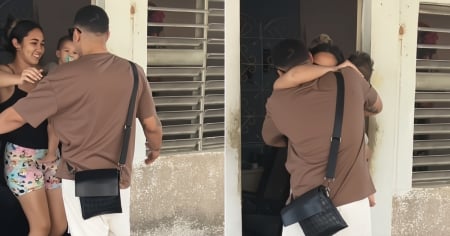A Cuban who returned to the island to reconnect with her family shared a video on TikTok that has sparked a wave of comments from users who resonate with her words: "You feel strange in your own land."
In the images published by the account @gentedefestejos, the woman can be seen arriving at what appears to be her former home in Cuba, as she reflects on what it means to return to a place that no longer feels like her own.
"And take care wherever you go, because once you leave, you never come back even if you return," she expressed with nostalgia.
The post quickly sparked a lively debate on the social network, where several exiled Cubans shared their own experiences. “Exactly. You feel like you're no longer from there,” wrote one user. Another commented: “You never return to being the same,” while someone else noted: “What a great truth.”
The feeling of not belonging upon returning to Cuba after having emigrated is a common sentiment among those who, after years away, decide to visit their family or reconnect with their past.
Social, economic, and personal transformations often create a difficult distance to bridge, even when stepping on the land where one was born.
This testimony brings to the forefront a reality shared by thousands of Cubans: the sense of displacement and the transformation of identity following emigration. It is an open wound that, as has been made evident in the comments, continues to be a source of reflection and collective catharsis.
Frequently Asked Questions about the Return of Cubans to the Island and the Feeling of Uprootedness
Why do many Cubans who return to the island feel that they no longer belong?
The feeling of uprooting experienced by Cubans returning to the island after having emigrated is due to the social, economic, and personal transformations that occur during their time away. The reality in Cuba can change significantly, and upon returning, many feel they no longer fit in a place that used to be their home. Furthermore, the distance and new experiences abroad contribute to a personal evolution that often does not align with life on the island.
What are the main challenges that Cubans face when returning to their country?
Cubans returning to the island may face several challenges, such as shortages of basic goods, difficulties with public transportation, and a complicated economic environment. These challenges, along with immigration restrictions and the economic crisis, make returning to Cuba an emotional and often difficult experience, especially for those who have experienced a better quality of life abroad.
What role do social media play in the reunions of Cubans with their families?
Social media has become a key channel for sharing and documenting the emotional family reunions of Cubans returning to the island. Platforms like TikTok allow users to showcase these moments of joy and nostalgia, creating empathy and connection among those who have had similar experiences. These viral videos reflect the profound emotional impact of reuniting with loved ones after long periods of separation.
How does the situation in Cuba influence the perception of emigrants upon their return?
The situation in Cuba, marked by economic and social difficulties, significantly influences the perceptions of emigrants upon their return. Many are confronted with a reality different from the one they left, facing issues such as shortages of basic products and services that contrast with their experiences abroad. This reality can intensify feelings of uprootedness and transform the way emigrants view their country of origin.
Filed under:
